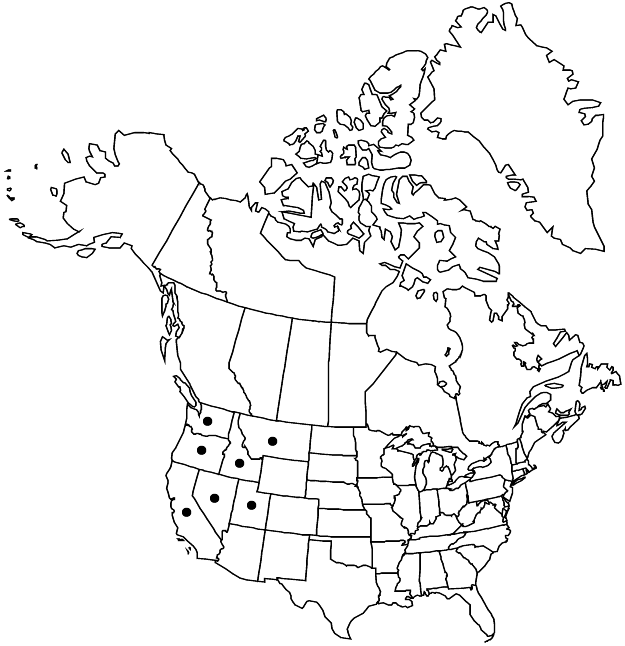Difference between revisions of "Eremogone aculeata"
Novosti Sist. Vyssh. Rast. 10: 139. 1973.
FNA>Volume Importer |
FNA>Volume Importer |
||
| Line 11: | Line 11: | ||
|name=Arenaria aculeata | |name=Arenaria aculeata | ||
|authority=S. Watson | |authority=S. Watson | ||
| + | |rank=species | ||
|publication_title=Botany (Fortieth Parallel), | |publication_title=Botany (Fortieth Parallel), | ||
|publication_place=40. 1871 | |publication_place=40. 1871 | ||
| Line 17: | Line 18: | ||
|name=Arenaria fendleri var. aculeata | |name=Arenaria fendleri var. aculeata | ||
|authority=(S. Watson) S. L. Welsh | |authority=(S. Watson) S. L. Welsh | ||
| + | |rank=variety | ||
}} {{Treatment/ID/Synonym | }} {{Treatment/ID/Synonym | ||
|name=Arenaria pumicola var. californica | |name=Arenaria pumicola var. californica | ||
|authority=Maguire | |authority=Maguire | ||
| + | |rank=variety | ||
}} | }} | ||
|hierarchy=Caryophyllaceae;Caryophyllaceae subfam. Alsinoideae;Eremogone;Eremogone aculeata | |hierarchy=Caryophyllaceae;Caryophyllaceae subfam. Alsinoideae;Eremogone;Eremogone aculeata | ||
| Line 35: | Line 38: | ||
|elevation=1500-3400 m | |elevation=1500-3400 m | ||
|distribution=Calif.;Idaho;Mont.;Nev.;Oreg.;Utah;Wash. | |distribution=Calif.;Idaho;Mont.;Nev.;Oreg.;Utah;Wash. | ||
| − | |discussion=<p>Some specimens from north-central California and southwestern Oregon have been named <i>Arenaria</i> pumicola < | + | |discussion=<p>Some specimens from north-central California and southwestern Oregon have been named <i>Arenaria</i> pumicola <i></i>var.<i> californica</i>. R. L. Hartman (1993) considered those plants to be robust forms of <i>Eremogone aculeata</i>, not deserving formal recognition. Based on work by M. F. Baad (1969), they warrant further study.</p><!-- |
--><p>Reports of <i>Eremogone aculeata</i> from Arizona, New Mexico, and Wyoming are erroneous.</p> | --><p>Reports of <i>Eremogone aculeata</i> from Arizona, New Mexico, and Wyoming are erroneous.</p> | ||
|tables= | |tables= | ||
| Line 45: | Line 48: | ||
-->{{#Taxon: | -->{{#Taxon: | ||
name=Eremogone aculeata | name=Eremogone aculeata | ||
| − | |||
|authority=(S. Watson) Ikonnikov | |authority=(S. Watson) Ikonnikov | ||
|rank=species | |rank=species | ||
| Line 60: | Line 62: | ||
|publication year=1973 | |publication year=1973 | ||
|special status= | |special status= | ||
| − | |source xml=https://jpend@bitbucket.org/aafc-mbb/fna-data-curation.git/src/ | + | |source xml=https://jpend@bitbucket.org/aafc-mbb/fna-data-curation.git/src/f50eec43f223ca0e34566be0b046453a0960e173/coarse_grained_fna_xml/V5/V5_116.xml |
|subfamily=Caryophyllaceae subfam. Alsinoideae | |subfamily=Caryophyllaceae subfam. Alsinoideae | ||
|genus=Eremogone | |genus=Eremogone | ||
Revision as of 22:50, 16 December 2019
Plants strongly mat-forming, glaucous, often with woody base. Stems erect, 7–25(–30) cm, densely stipitate-glandular distally. Leaves: basal leaves persistent; cauline leaves in 1–3 pairs, abruptly reduced distal to lowest pair; basal blades ascending or often arcuate-spreading, needlelike, (0.5–)1–2.5(–3.5) cm × 0.5–1.5 mm, rigid, herbaceous, apex spinose, glabrous to puberulent, glaucous. Inflorescences 5–25+-flowered, open cymes. Pedicels 3–25 mm, stipitate-glandular. Flowers: sepals 1–3-veined, lateral veins less developed or all obscure, ovate, 3–4.5 mm, to 6 mm in fruit, margins broad, apex usually obtuse to rounded, abruptly acute, sparsely to densely stipitate-glandular; petals white, obovate to oblanceolate, 4.5–10 mm, 1.5–3 times as long as sepals, apex rounded; nectaries as lateral and abaxial rounding, with slight lateral expansion, at base of filaments opposite sepals, 0.3 mm. Capsules 5–9 mm, glabrous. Seeds yellowish tan to gray, ellipsoid-oblong, 1.8–2.5(–3.2) mm, tuberculate; tubercles rounded, elongate. 2n = 22.
Phenology: Flowering summer–early fall.
Habitat: Rocky slopes, alluvium, volcanic areas
Elevation: 1500-3400 m
Distribution

Calif., Idaho, Mont., Nev., Oreg., Utah, Wash.
Discussion
Some specimens from north-central California and southwestern Oregon have been named Arenaria pumicola var. californica. R. L. Hartman (1993) considered those plants to be robust forms of Eremogone aculeata, not deserving formal recognition. Based on work by M. F. Baad (1969), they warrant further study.
Reports of Eremogone aculeata from Arizona, New Mexico, and Wyoming are erroneous.
Selected References
None.